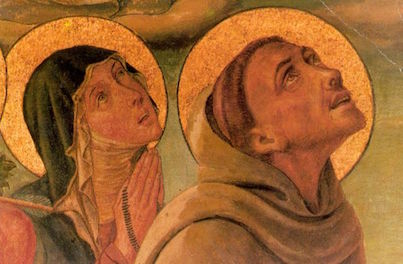

St. Francis lived during a period of widespread corruption and depravity throughout the Roman Catholic Church. St. Anthony of Padua, an early Franciscan, famously left his monastery, being at that time an Augustinian monk, for these reasons. Had he given up his affluent life of wealth, personal prerogative, and worldly pleasures for this?! But learning of the newly founded Franciscans, he saw that there was a way ahead for a young man or woman intent on a call to holy life. He had met young people like himself, from affluent families, who wanted something better, something purer. Indeed, the whole European lifeworld of this period was filled with people who were disillusioned with the Church, who wore white garments signifying purity and who called themselves Albigensians ("our origin is purity or whiteness"), also known as Cathars because they wished to be cathartic, to purge the Church of corruption and perversion.
St. Francis' love of the Church prohibited any thought of his entering what amounted to a "New Age religion"; still, the state of the Church was unacceptable to him. What could he do? He would become the real Church, the Church of Jesus and the Apostles. and live the life they had lived. He and his followers would adhere to the original Church, the primitive Church of the first centuries A.D. Their Rule of Life would be the Gospels. Their goals would be to live the Beatitudes. Their life would be simple, pure, loving, and faithful. His insight would change the world, for no single life, aside from the life of Jesus, has touched so many people in the way they lived their lives. Franciscanism itself was, and we pray remains, a holiness movement ever striving for simplicity, purity, charity, and faithfulness.
The earliest spiritual adventures of love carried into the world by the Franciscan apostles were recorded and gathered into a collection of stories, the Fioretti, or "Little Flowers" (the Hawaiian phrase is Na Pua Li'i). The phrase suggests infinite variety in shape, color, fragrance, and character as well as seed that blows all over world. Since that time, millions and millions of flowers have come to bloom as men and women have chosen to follow St. Francis in countless religious orders, congregations, societies, and communities — secular, religious, and lay; single and married; Roman Catholic, Anglo-Catholic, Old Catholic, Polish National, .... the little, poor man (Il Poverello) has captured the imagination of people all over the world. For people understand suffering; it is part of their lives (for many, the main part), and they also understand the life of joy that triumphs over it. This is the Gospel life, the life that has been set before us as the royal road. And it extends everywhere even as it leads to one place, which is our lasting happiness.
Here in Hawai'i the culture is deeply grounded in